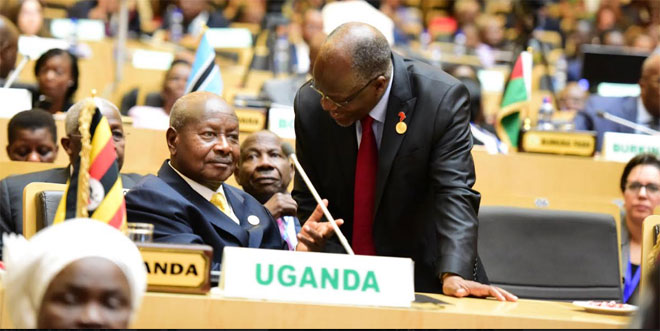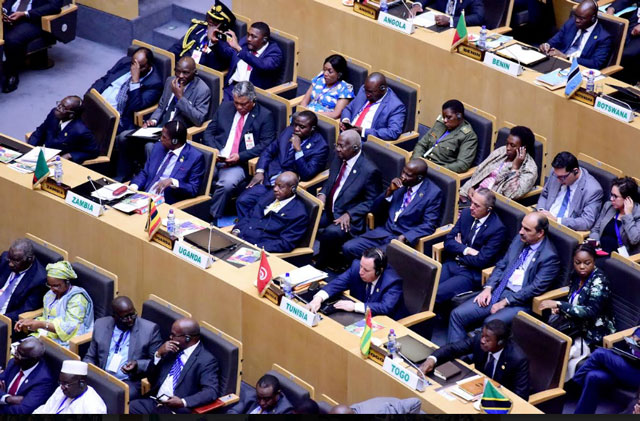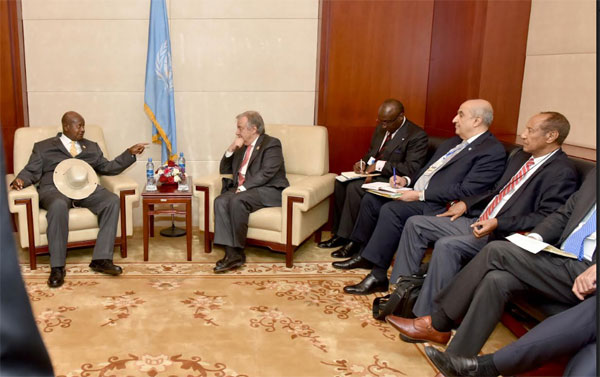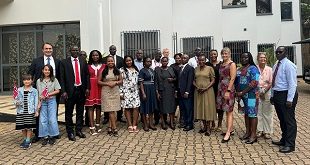
Uganda has been described as one of the countless examples of governments leading society and acting decisively in building a better life for current and future generations despite challenges. The African Union singled out its campaigns to end child marriages, give the other half of the population the opportunity to stay in school, to be healthy and to reach their full potential.
“Despite the challenges we face, we have countless examples of governments leading society, acting decisively in building a better life for current and future generations,” Nkosazana Dlamini Zuma the Chairperson of the African Union Commission said in her last address at the 28th Ordinary Session of the Assembly of Heads of State and government of the African Union currently taking place in Addis Ababa Ethiopia.

The African Union which saw four new heads of state make their first appearance at the summit including Gambia, Ghana, Sao Tome, Seychelles is robust with hope in its youthful population pledging to do more to unlock the potential of young people since they constitute the majority of our population.
“The future of Africa belongs to the youth, but the quality of the future will be determined by what they make of it today. Youth therefore, have responsibilities to learn, read, serve, participate, innovate, build and create. On our part, we will this year appoint a Special AU Envoy for Youth to mobilise and advocate for the youth,” Dr. Dlamini Zuma said.
The summit is being held under the theme, “Harnessing the Demographic Dividend, through Investment in African Youth.”
Last year African leaders meeting in Nairobi, Kenya adopted President Yoweri Museveni’s paper on bottlenecks facing Africa’s development as a blue print to guide the continent following a meeting of the African Peer Review Mechanism (APRM) where he explained the 10 bottlenecks to Africa’s growth and development.
Dr. Dlamini Zuma said the programmes of beneficiation and economic diversification, agricultural modernization and the development of agro-processing, must of necessity target the creation of jobs and economic opportunities for young entreprenuers.
Among others, Uganda was also hailed for its progress on the free movement of persons alongside Benin, Comorros, Ghana, Madagascar, Mozambique, Namibia, Rwanda, Seychelles and Togo following the launch of the African passport. They already offer visa free access or visa on arrival for all Africans. Uganda was also hailed for its refugee policy
At a meeting shortly after the opening ceremony, President Yoweri Museveni was honoured for his country’s commitment and innovation in the fight against malaria.
The outgoing AU Chairperson Dr. Dlamini Zuma and the UN Secretary General Antonio Gutterez handed over the award to President Museveni.
In a press release shortly before the event, the African Leaders Malaria Alliance (ALMA) announced eight African countries honoured for their leadership in the fight against malaria.
“At a time of historic progress toward a malaria-free Africa, the honoured eight African countries that have shown commitment and innovation in the fight against the disease. Today at the 28th African Union Summit, the 2017 ALMA Awards for Excellence were awarded to: Botswana, Cabo Verde, Comoros, Democratic Republic of Congo (DRC), Ethiopia, Swaziland and Uganda, for their impact on malaria incidence and mortality and Chad, for its leadership in the fight against malaria.
“Thanks to strong African leadership and innovative new partnerships, we are making unprecedented progress in the fight against malaria,” said H.E Idriss Déby Itno, President of Chad and current Chairperson of the African Union. “The success of these countries shows the powerful impact that dedication and sufficient funding can have.”
The ALMA Awards for Excellence recognise countries for their significant achievements in malaria control and elimination. Botswana, Cabo Verde, Comoros, DRC, Ethiopia, Swaziland and Uganda have all achieved a reduction in malaria incidence of 40 percent or more from 2010-2015. The significant reduction in malaria in the three high-burden countries (DRC, Ethiopia and Uganda) demonstrates what can be achieved with political commitment, adequate financing and implementation of technically sound and evidence-based vector control and case management interventions, even where malaria transmission is high. Botswana, Cabo Verde, Comoros and Swaziland are commended for sustaining the gains previously made between 2000-2010. The World Health Organization (WHO) said they are all on track to eliminate malaria by 2020.
“We are turning the tide on malaria in Africa,” said Joy Phumaphi, Executive Secretary of ALMA. “The success is reflected in the countries ALMA honoured today. Our work is not done. We must remain focused to achieve our goal of a malaria-free Africa.”
The 2017 ALMA Awards for Excellence come just six months after the adoption of the ‘Catalytic Framework’ at the 27th African Union Summit last July. The framework provides a roadmap for African countries to increase domestic resources, expand the use of innovation and technology, and improve health infrastructure to eliminate malaria from the continent by 2030.
Uganda, United Nations to host solidarity conference on refugees

President Yoweri Museveni and the new United Nations Secretary General Antonio Guterres have engaged in a series of discussions ranging from the security situation in Somalia to South Sudan to Burundi and the Democratic Republic of Congo and pledged to strengthen efforts to develop sustainable peace and development in the region.
The two leaders who were meeting at the sidelines of the 28th Ordinary Summit of the AU in Addis Ababa, Ethiopia agreed on the need for the building of a national political ideology and national army in Somalia, and a need for the leaders in South Sudan to embrace democracy and fight sectarianism for the sake of peace in the newest nation and the importance of dialogue for all stakeholders in Burundi.
Guterres hailed Yoweri Museveni’s influence and role in ensuring peace and security in the region and for his efforts as mediator in the Burundi conflict to ensure dialogue by all stakeholders.
He pledged to push for reforms at the United Nations as more countries rally to see a more reformed world body.
Uganda used its presidency of the UN General Assembly at the 69th session to push the African agenda on the reform of the United Nations.
Museveni said then, that Africa and individual African countries can form credible partnerships beyond the continent’s shores and that reforms as will be agreed by all, will strengthen the United Nations not otherwise.
During the meeting, Museveni urged the United Nations to help Uganda deal or handle the refugee situation, which is posing growing challenges each day. Uganda is the second largest refugee hosting country after Turkey in the world.
The two leaders agreed to host a solidarity conference on refugees in March with both Uganda and the United Nations as conveners.
Museveni also urged the United Nations to support Uganda’s efforts on environment reclamation if its to meet SDG 15 of the United Nations development goals to protect, restore and promote sustainable use of the terrestrial ecosystems, sustainable manage forests, combat desertification, and halt and reverse land degradation and halt biodiversity loss.
 The Independent Uganda: You get the Truth we Pay the Price
The Independent Uganda: You get the Truth we Pay the Price


